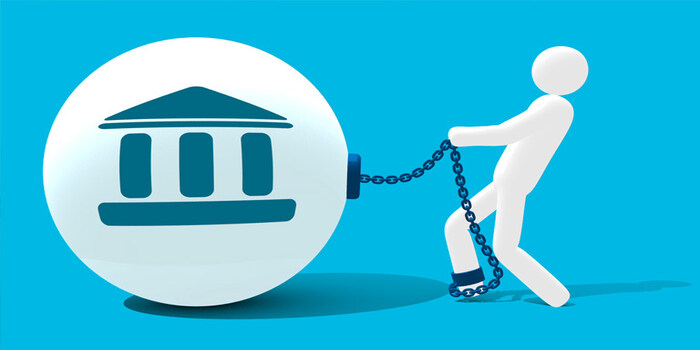How Much Equity Can I Borrow from My House
Jul 01, 2023 By Susan Kelly
Have you ever had to make a large purchase and needed access to extra cash? Many homeowners increasingly turn to their properties as a source of funds, such as borrowing equity from their houses.
Equity is the difference between your property worth and any loans that must be paid off. It can give you extra spending money or help pay for home improvements or renovations. But how much can you borrow against your house's equity? Read everything you need to know about tapping into this potential funding source!
What is Home Equity

Home equity is the value of your home at any given time. It's calculated by subtracting the outstanding loans and mortgages from the current market value of your property. If you own a house outright, then you have 100% equity. When tapped into this equity, it provides an additional funding source for homeowners.
Ways to Take Equity Out Of Your Home

Home Equity Loan
A home equity loan is a fixed-term loan, usually for 10 to 15 years. You get the entire loan upfront at closing and pay it back in regular monthly installments or through a lump sum payment at maturity. The interest rate on these loans is lower than that of other types of credit, and you may also be able to deduct the interest you pay on your taxes.
HELOC
Similar to a credit card, a home equity line of credit (HELOC) is a revolving loan. You can take out a loan up to a particular amount and use it as you see fit over time, paying the balance off whenever you want to. HELOC interest rates typically fluctuate over time and are frequently correlated with prime rates.
Cash-Out Refinance
A cash-out refinance lets you take out a new mortgage loan at a lower interest rate than your existing one. You can use the difference in the loan amounts for anything you want, from home improvements to debt consolidation. The interest paid on this type of loan may also be tax deductible.
No matter which option you choose, it's important to understand all the terms and conditions before taking out a home equity loan or HELOC. Make sure you shop for the best rates and terms and read the fine print before signing any agreement. With careful planning, you can tap into your home's equity and use it to your advantage.
How To Calculate The Equity You Have In Your Home
The first step to calculating your home equity is to determine the current value of your property. This determination can be done by having an appraisal or using a real estate agent's estimate.
You will then need to subtract any outstanding loans from this amount, such as mortgages or home equity lines of credit (HELOC). The resulting total is your available equity.
Equity can be a powerful financial tool, but it's important to consider the risks associated with borrowing against your property before taking out a loan. Interest rates on home equity loans are usually higher than regular mortgages, and lenders limit how much money you can borrow. Understanding any loan's terms and conditions is important before signing up.
The amount available also depends on how much debt you already have associated with your house. Lenders will assess your overall financial situation and determine if a loan is suitable based on their assessment of your credit score, income level, existing debts, and ability to make timely payments.
Generally speaking, you can get 80 to 85 percent of the value of your home in a loan or HELOC. If your house is worth $500,000, you could borrow up to $425,000.
Calculating the loan-to-value (LTV) ratio
To determine how much equity you have available to borrow, lenders use a loan-to-value (LTV) ratio. Your LTV is determined by dividing the total mortgage debt against your property by its appraised market value.
For example, if your home's appraised market value is $200,000 and you owe $160,000 in mortgage debt, the LTV would be 80%. The higher the percentage of debt compared to the home's value (the higher the LTV), the less equity you can borrow. Generally speaking, lenders tend to offer lower loan amounts if your LTV is over 80%.
The amount of equity you can borrow from your house depends on many factors, so it's important to research and consider all options before making any decisions. With careful planning and budgeting, however, tapping into the equity in your home can provide an effective way of accessing extra funds.
Pros and Cons of Tapping Home Equity
There are a few key points to consider when accessing equity in your home. Homeowners should weigh the pros and cons of tapping into their equity before making decisions.
Pros:
- Home equity can give you access to large amounts of cash you may not be able to get through other means. This access can help pay for renovations or major expenses like college tuition.
- Homeowners can choose from loan products when borrowing against their house's equity, such as fixed-rate loans, adjustable-rate mortgages (ARMs), and HELOCs (Home Equity Lines of Credit). Each option has advantages and disadvantages depending on your needs.
- Accessing home equity can be beneficial in that it can help you pay off debt or other existing loans.
Cons:
- Homeowners must remember that taking out a loan means repaying the amount borrowed plus interest. This repaying can add up significantly over time and increase the overall cost of the loan.
- Borrowers should be aware that their house is used as collateral when accessing home equity, which can put them at risk if payments are not made on time. As such, homeowners should consider all options carefully before making any decisions.
- Also, keep in mind that tapping into your house's equity will reduce its value if you need to sell it later on down the road. As such, taking out the right amount and type of loan for your financial situation is important.
ways To Increase Your Home Equity
- Pay off your existing mortgage: The more you pay down on a mortgage, the higher your equity increases. Even small amounts of extra payments can make a big difference over time.
- Improve or renovate your property: Renovating or making improvements to your home can help increase its value and, thus, your equity. For example, adding space by converting an attic into another bedroom may add value to the house.
- Refinance with a better interest rate: If you can qualify for a lower interest rate than you currently have, you can save money in the long run and increase the amount of equity you can borrow from your house.
FAQs
How much equity can you borrow from your home?
This amount depends on many factors, such as the loan-to-value (LTV) ratio and credit score. Generally speaking, you can get up to 80 to 85 percent of the value of your home in a loan or HELOC.
Is it better to borrow against my house's equity or take a personal loan?
The type of loan you take out depends on your needs and financial situation. Home equity loans generally offer lower interest rates than personal loans, but risks are associated with tapping into your house's equity. It's important to compare different loan products and read the terms and conditions before deciding.
What is the monthly payment on a $50000 home equity loan?
Your monthly payment will depend on your chosen interest rate and loan term. Generally speaking, a $50,000 home equity loan with a 10-year term and a 3.5% interest rate may have an estimated monthly payment of $482.51.
Conclusion
Tapping into home equity is a great way to free up some extra cash. Your loan-to-value ratio and other factors tell you how much equity you can access from your home. Just do your due diligence and research thoroughly before taking out any loan. Consider the pros and cons of tapping into your home's equity to decide if it's the right move for you. Furthermore, consider ways to increase your home's equity if you first pay down an existing mortgage or take on some renovations.








